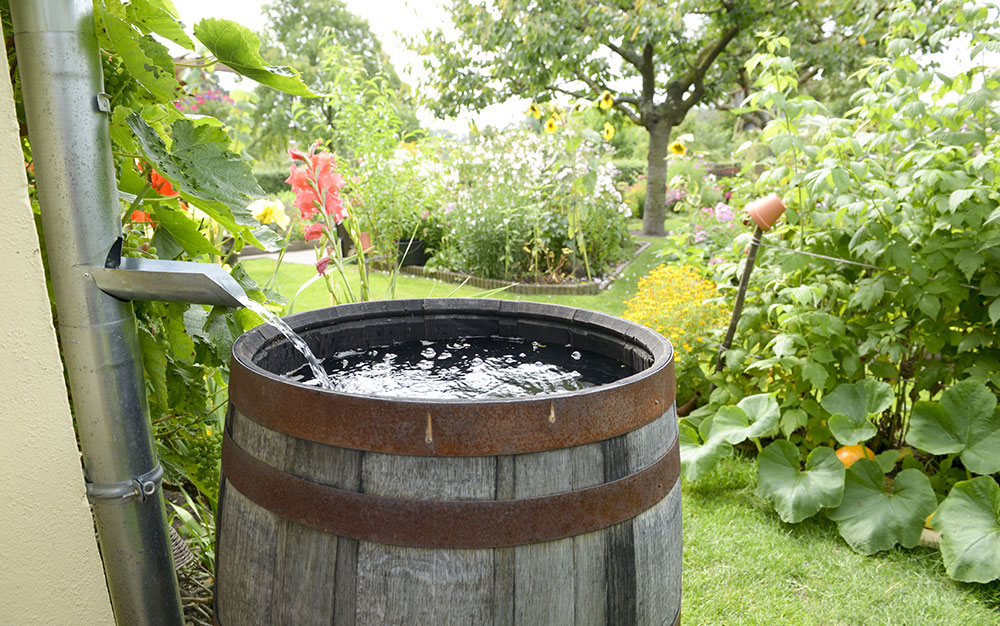One of the most rewarding parts of gardening, is working in sync with the environment and gardening organically provides an opportunity to grow how nature intended.
So, let’s get to grips with what that means and how you can up your organic efforts.
Organically great
If you’ve always wanted to try organic gardening, there’s never been a better time. Organic gardening is, in essence, trying to grow as closely as nature intended. It’s not complicated; like starting a jigsaw and putting down each piece at a time.
It can be used to benefit wildlife, invest in your soil or perhaps just to cut back on synthetic plant food or weed and pest controls. Here are five fantastic ways to get you on the road to growing organically:
1.Pourfect plants:
Harvesting your own water, rather than using tap water, gives you access to a bundle of benefits.
Install a water butt and water is at your fingertips and convenient to use, even in the summer. Water is fed down from the roof and stored in a container with a tap.
Installing one for the greenhouse, shed, garage or your home will give you access to water which is better for your plants than treated water from the tap.
This is because rainwater has the correct pH level to grow plants productively all year round, whereas household water supplies should only be used in the short term to ensure they don’t inhibit growth.


2.Keep control:
Staying on top of pests and weeds without using synthetic treatments isn’t always easy, but it is most rewarding for organic gardeners to overcome the challenge using garden know-how and good old-fashioned elbow grease.
Companion planting, the process of positioning plants that aid neighbouring plants, can be used to help reduce pests. If you want to vanquish whitefly, for instance, plant some marigolds.
Blackfly and greenfly can be kept in check with the use of neem oil or use washing up liquid to eradicate aphids.
For weeds, I find it’s best to just pull them up. Annual weeds, those growing fresh each year, can be easily controlled with a hoe as this cuts the tops off, but perennial weeds, which come back each year – like dandelions and nettles, should be pulled up by the root—the secret is to do this little and often to regain control.
3.Toil-free soil:
Many organic gardeners prefer not to use synthetic feeds and instead enrich the soil to allow the microorganisms make food for the plant naturally.
Just position a bucket at your back door or an enclosed container on your countertop to capture all your veg peelings and then add into a composter. Instead of letting the stems of harvested Brussels sprouts go to waste, return the stems back to the soil through composting—it’ll cut down on waste and does wonders for the ground too.
Leaf mould is brilliant for soil. You can get started with this really easily; buy yourself a hessian sack online and then fill it with leaves, chucking it behind your garden shed over winter to breakdown.
It can give up to 50% more water retention for soils, as well as providing better structure and encouraging soil life, like earthworms, for aeration.

Well-rotted manure can be dug into the garden to give your microorganisms the bacteria they need to thrive and produce healthier soil or simply supplement your soil with organic feeds, which are available from local garden centres.

4.Wild about wildlife:
Encourage more hedgehogs, frogs and birds into your garden and they’ll be great garden protectors; eating any unwanted slugs for you.
Add in a hedgehog house or ample water supply for birds and you’ll begin to see your plants benefit.
A small garden pond will entice in frogs and give a water source to other visiting creatures—just make sure to put a plank of wood as an escape route for any inquiring hedgehogs.
Many beneficial insects have a veracious appetite for greenflies. A single ladybird will eat up to 5,000 aphids in their lifetime. I string together pinecones and position them in the garden as a place for hibernation for little ladybirds and bug hotels are great too.
You’ll find many tutorials online about making your own bug hotels, it’s easily done, and these creatures will help your towards organic gardening.
5.Grow your own:
You can grow your own all year round. Herbs like thyme, rosemary and sage are perfect as perennials. You can even grow your own sauces with chillies and tomatoes or have leaf crops, like salad and cabbage.
Try tasty treats such as asparagus and don’t forget fruits in the form of currents, raspberries, or a cheeky apple tree; all the ingredients to grow your own dinner and, by using these methods, done so organically.
These nature-first tips are all you need to try your hand at some honest, easy and outstanding organic gardening.

Tip:
Scrunched up silver foil, like that
from the kitchen, can be used as a scrubber to
remove soil off garden tools.
Reader questions
Can I grow an orchid on a windowsill?

Many orchids can be successfully grown on a windowsill, provided it is not in direct sunlight in the summer months. Moth orchids varieties are best—these phalaenopsis hybrids need up to three hours of sunlight per day and do best when their roots are kept in a clear pot.
I’m planting a meadow garden, does soil fertility matter?

Yes, a meadow relies on a happy balance of grasses and flowering plants. If the soil is too fertile, the grasses will grow lush and the flowering plants will be unable to compete. Autumn-sown seeds generally germinate and establish quicker when sown on lighter soils.

Leave A Comment